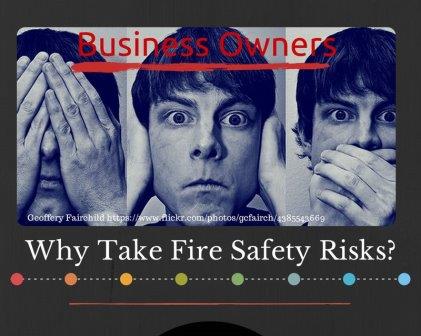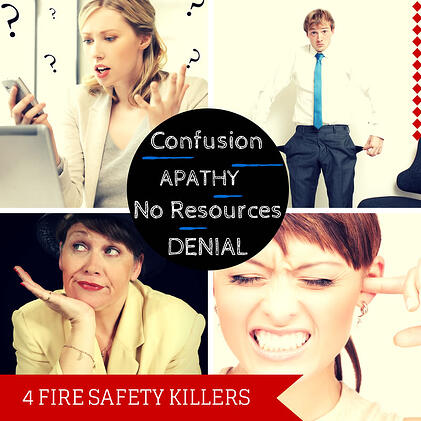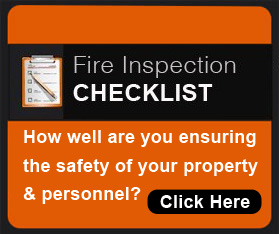Why do Toronto business and property owners take risks with fire safety?
In any given week, the regional media covers many devastating fire stories, centered around these themes:
- Landlords and business owners facing substantial fines for fire safety violations. (Typically four to five figures, plus -increasingly- jail time. Recent examples: Hamilton landlord, Multiple offenders in Barrie).
- Business and property owners facing substantial loss of property and business disruption due to fire. (Damage often estimated in six figures. Recent examples: Barrie apartment fire, Hornings Mills business fire, Windsor bumper plant fire, Gatineau recycling plant fire, Havelock restaurant fire).
- Injury, death, and property damage where lack of working fire alarms and/or sprinklers was a factor. (Recent examples: Windsor fire, Dupont-Dovercourt fire).
Why don't businesses and property owners take all of this news as a wake-up call and get up to speed on fire safety compliance?

This is something we've given great thought to.
Business and property owners are unlikely to register the constant stream of recommendations, best practices and compliance updates that are tossed around within the fire safety industry. That makes sense enough. As small business owners ourselves, we know its a juggling act to keep a business running successfully. It's a challenge just to stay on top of news and trends in your own industry. There is little time for fire safety. Unfortunately, when the fire safety conversation takes place exclusive of business and property owners, no progress occurs.
Rohen follows international fire safety trends on social media. The laws may differ, but basic fire safety principles are universal. One item that recently caught our attention was a survey published by FireUK which features some startling statistics.
Of the 580 small businesses they surveyed, they found:
- 90% of small businesses with fewer than 10 employees failed to conduct appropriate fire-risk assessments, or follow basic fire safetyprocedures.
- 90% of small business owners were unaware of their responsibility to conduct a fire-risk assessment on their premises.
There’s no telling what these statistics would look like if Toronto’s businesses had been surveyed. Still, this survey raises an important point about a potential "blind spot among business owners who don't know where their responsibilities lie," (to quote FireUK spokesperson Mark Hall). Hall also said FireUK was "shocked to the core" by their survey results, and did not expect to find "whole sectors of small businesses playing Russian roulette with people's lives."
In a discussion of FireUK’s study (by IFSEC FIRE, here) Adam Bannister identified three reasons for the gap between small business owners’ fire safety obligations and their expressed lack of knowledge about their legal responsibilities. Namely: ignorance, confusion, and neglect. (He also later quotes fire safety expert Simon Ince who cites "apathy, ignorance, and denial...").

Here's Rohen's take on the factors behind business owners' fire safety failures, in order of importance:
#1: Confusion
Most business and property owners’ so-called “ignorance" comes from confusion about the law and how it applies to them. In fairness, it is confusing! Multiple codes apply, they are housed in separate places (Fire Code, Building Code, different jurisdictions) and standards differ based on the age of your building. It's challenging for a layperson to access and interpret the information to figure out what they need to do to comply with all relevant fire safety requirements . . . even if they want to.
Example: Some of FireUK’s survey subjects mistakenly thought that if they were in a rented building or unit, they were not responsible for fire safety, assuming the responsibility lay exclusively with the building’s owners. Others thought responsibility for fire safety “only applies to big companies.”
Myth-busting: Think fire safety is the purview of building owners? Think again! An article on fire safety planning in Canadian Property Management recently took on the definition of “building owner.” In practice, author Barbara Carss says, this title may “apply to a range of responsible parties beyond the holder of the property’s title.” In the same article, fire safety expert Kevin Boudewyn says, “the owner can be anyone who has care and control of the building. That could be the property manager or building security or superintendent. Whoever is holding the keys at the moment, that’s the owner.”
#2: Lack of Resources
Smaller business owners and landlords don’t have the same resources as big, enterprise entities. So they struggle even more to stay compliant with evolving and potentially costly fire safety requirements (Ontario's new sprinkler requirement is a great example). Pressed for time and money, Toronto’s property owners definitely feel the pinch, and may feel that compliance is out of reach.
Example:FireUK’s survey subjects indicated that they considered fire safety & compliance to be a “secondary consideration when budgets were tight.”
Example: In another recent Canadian Property Management article exploring Toronto’s rooming house fire safety, affordable housing expert Michael Shapcott says, ". . . [rather than being] bad guys out to ruin lives, [many landlords] just do not have the income stream or access to capital to make the necessary upgrades that would bring their buildings up to code.”
Myth-busting: Sometimes there may be a solution that is less-expensive that you may think. For example, this Canadian Property Management article talks about new fire safety technology that is more cost-effective than older options. Also, this article about Ontario’s new sprinkler requirement mentions that less-expensive sprinkler solutions will be allowable for certain facilities. Fire protection costs are very personalized based on your facility and your needs. You should explore your options and get specific quotes before concluding that fire safety compliance is unattainable.
#3: Apathy
Apathy has been identified (by The University of Buffalo) as a reason why people fail to heed disaster warnings. I suspect this is related to information overload. People tune-out fire safety because they are trying to tune-in to other things, and there’s just so much noise coming all at once. Apathy around fire safety is no different from apathy towards all kinds of disasters we see on the news every day. Not that it should excuse us from being accountable, but the fact is: society is increasingly apathetic.
As with all disasters, those devastated by fire never thought it could happen to them.
Myth-busting: This one’s quick- yes, it can happen to you.
(Apathy, by the way, has been correlated with brain shrinkage, so I don’t know if I can say with certainty that getting over your apathy about fire safety will make you smarter…but it might not hurt….)
#4: Denial
Even when they know it to be untrue, some business owners still tell themselves that they cannot (or don't have to) engage in fire safety compliance activities. These are business owners who know they “should do something" about fire safety but tell themselves they can get by without it, for one reason or another.
Example: Some of FireUK’s survey subjects indicated that they “put their trust in their staff escaping from a fire on their own initiative.”
Myth-busting: Here are four ways to burst those bubbles of denial:
- By law you must comply with fire safety regulations.
- Fines for fire safety violations can be astronomical. In Barrie, owners of a motel were recently fined $750,000 (and face likely jail time).
- Can you financially shoulder the downtime, lost business, and cost to rebuild after a fire?
- Could you handle the injury or death of someone you work with that resulted in any way from your lack of fire safety precautions?
Conclusion: There's no doubt that there are legitimate obstacles to fire safety compliance; that's why there is a need for fire safety professionals! So, what are some solutions to get around these problems? There is no simple, one-size-fits-all solution, but in our next post, we’ll explore some ideas.


